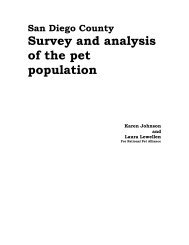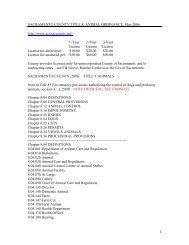Page 1 of 330 The Monthly National Legislation Report 7/5/2010 ...
Page 1 of 330 The Monthly National Legislation Report 7/5/2010 ...
Page 1 of 330 The Monthly National Legislation Report 7/5/2010 ...
Create successful ePaper yourself
Turn your PDF publications into a flip-book with our unique Google optimized e-Paper software.
<strong>The</strong> <strong>Monthly</strong> <strong>National</strong> <strong>Legislation</strong> <strong>Report</strong>http://mnlreport.typepad.com/<strong>Page</strong> 199 <strong>of</strong> <strong>330</strong>7/5/<strong>2010</strong>LEGISLATION INOTHER COUNTRIES OF INTERESTAUSTRALIABrisbane - (6/23/09) - Some cat owners will be afforded a one-year reprieve from compulsory pet registration, after Gold Coast City Council last night became the second local authority tothumb its nose at new state laws, due to take effect in Brisbane on July 1. From next Wednesday, Brisbane cat owners will need to dish out $39 a year to register desexed cats or $78 forthree years to register their feline friends. However, Gold Coast and Moreton Bay councils have chosen to waive the fees for at least 12 months, amid criticism the registration program is"impractical" and costly. Logan and Brisbane City Councils have <strong>of</strong>fered a 12-month amnesty for owners <strong>of</strong> desexed cats. However owners <strong>of</strong> cats, at least three-months-old and not desexed,will face a fine <strong>of</strong> $200. Gold Coast City councillor Bob La Castra said the registration plan had been sprung on the council, which would be left with a $55,000 advertising bill to informresidents <strong>of</strong> their new responsibilities. "This was basically dumped in our laps. We don't have the IT programs in place to handle the registration," he said.Mitcham - (6/2/09) - MITCHAM council has indefinitely delayed the introduction <strong>of</strong> strict new cat control laws amid claims from its own members it "rushed" into the decision last week. At aspecial meeting tonight, councillors unanimously called for a report into the impact and costs <strong>of</strong> a new regime that would ban residents from owning more than two cats and force them tomicrochip and register the animals. <strong>The</strong> council last week voted 7-6 in favour <strong>of</strong> introducing some <strong>of</strong> the toughest cat laws in the state, but failed to achieve the "absolute majority" <strong>of</strong> eightvotes required to make them legally binding.WA - City <strong>of</strong> Joondalup - (6/20/09) - Cat ownership in WA is under siege by local cat laws newly introduced by the Shire <strong>of</strong> Swan and soon to be implemented by the City <strong>of</strong> Joondalup. Catowners will be penalized by fines if their cat unwittingly trespasses onto a neighbours property without their permission. <strong>The</strong> ultimate penalty is the trapping <strong>of</strong> your beloved moggy by aneighbour in a trap supplied by the shire and the impoundment and possible euthanization <strong>of</strong> your cat if you can’t locate it within 7 days. <strong>The</strong> legal trapping <strong>of</strong> cats opened up by these newlocal cat laws will only encourage vigilantes who hate cats to have an ‘open season’ on cats in their neighborhood. <strong>The</strong> Cat Haven, a well known Perth based cat rescue group have alreadyreported incidences <strong>of</strong> cats caught in traps being drowned in lakes. A horrible death for any animal with no chance <strong>of</strong> escape – and astonishingly still a set <strong>of</strong> laws introduced in such poorformat by local councils that policing these laws is almost impossible.Yarra Ranges - (6/16/09) - YARRA Ranges councillors waded into the contentious issue <strong>of</strong> mandatory desexing <strong>of</strong> cats last week … but they kept to the shallows. <strong>The</strong>y unanimously supporteda motion that cats not previously registered would not be accepted for registration after 10 April next year unless they were desexed or exempted. Compulsory desexing was proposed as part<strong>of</strong> the shire’s Domestic Animal Management Plan adopted in October last year. Councillors Samantha Dunn and Tim Heenan launched a strong case in favour <strong>of</strong> compulsory desexing includingstatistics from animal protection organisations that reported 53,000 cats lodged with animal welfare centres across Australia and 35,000 being euthanased. “That’s a lot <strong>of</strong> unwanted cats andkittens out there preying on wildlife and I can see no reason why any responsible owner <strong>of</strong> a domestic moggie would not support desexing,” Cr Dunn said. Cr Heenan said there had beensubstantial loss <strong>of</strong> wildlife in the Dandenongs over the years. “I have no time for people who allow them to roam and if this is the way for those numbers to be controlled, I am for it,” hesaid. <strong>The</strong> report from the shire’s planning, building and health department said that while most <strong>of</strong> the animal welfare organisations consulted, including the Victorian Animal Aid Trust atColdstream, supported compulsory desexing <strong>of</strong> cats, the Australian Veterinary Association (AVA) was against it. Cats will be exempted based on veterinary advice, if they belong to aregistered breeder, or pet shop, or if they are registered with an approved association. <strong>The</strong> exemptions provided a balance between the opposing arguments, the report said.CHINA(6/19/09) - Animal abuse or harm such as the controversial dog culling in Hanzhong, Shaanxi province would be illegal under a new draft law. If passed through the country's legislativeorgans, it would be the first time that the concept <strong>of</strong> "animal welfare" is added to law. Experts have completed drafting the country's first animal protection law and are now in the process <strong>of</strong>revising it before its submission to government and congress authorities, said Chang Jiwen, a law pr<strong>of</strong>essor with Chinese Academy <strong>of</strong> Social Sciences who led the drafting team. UPDATE: Adraft <strong>of</strong> the country's first law on animal protection has proposed a fine <strong>of</strong> up to 6,000 yuan ($877) and two weeks detention for those found guilty <strong>of</strong> animal cruelty. "<strong>The</strong> proposal will besubmitted to the State Council by the end <strong>of</strong> the year," Chang Jiwen, director <strong>of</strong> the social law research department <strong>of</strong> the Chinese Academy <strong>of</strong> Social Sciences, who authored the draft, toldChina Daily Thursday. As part <strong>of</strong> strict measures to manage and control the animal population in the country, the draft also proposes a prohibition on pet owners from breeding their animals,said Chang. <strong>The</strong> draft law further makes it compulsory for data chips to be implanted in pets to track down their owners in case the animals are found abandoned. "<strong>The</strong>se rules will ensurethat people who abandon their pets will be prevented from raising more animals," he said. <strong>The</strong> proposal will be posted on www.china.com.cn, a major information portal, to solicit publicopinion in August, Chang said.Guangzhou - (6/18/09) - Mrs. Chen can't imagine abandoning one <strong>of</strong> her two best friends: her scruffy terrier mutt and a white fluffy Pekingese mix with buggy eyes. But that's what thegovernment in this southern Chinese city wants the middle-aged housewife to do when a one-dog policy takes effect in Guangzhou. Beginning July 1, each household can raise only one pooch.<strong>The</strong> regulation won't be grandfathered in, so families with two or more dogs will apparently have to decide which one gets to stay. "It's a cruel regulation. <strong>The</strong>se dogs are like family. How canyou keep one and get rid <strong>of</strong> the others?" said Chen, who declined to give her full name because she feared the police would track her down and seize the dogs. Such dog controls have touched<strong>of</strong>f resentment among urban — mostly new middle class — Chinese in other cities. <strong>The</strong> Guangzhou measure comes as many are worrying about the economy, and there's potential for theregulation to trigger a public backlash. Police and city government <strong>of</strong>ficials appear to be aware <strong>of</strong> the issue's sensitivity. <strong>The</strong> Associated Press spent three weeks making calls and sendingfaxes to <strong>of</strong>ficials requesting an interview about the policy. But after the requests were passed back and forth between the police and city government, neither agreed to discuss it. <strong>The</strong>regulation appears to be part <strong>of</strong> an effort to control stray dogs in Guangzhou, once known as Canton. An hour north <strong>of</strong> Hong Kong by train, it is one <strong>of</strong> the richest cities in China and has arapidly growing middle class that can afford to own dogs.Shanghai - (6/21/09) - <strong>The</strong> Chinese have a supremely ambivalent relationship with dogs. <strong>The</strong>y still like to eat them in winter because it is good for the blood. <strong>The</strong>y also consider them to bepests and cull them on a semi-regular basis. And, recently, a growing number <strong>of</strong> newly affluent urbanites like to keep cute little puppies as pets. It means that when you see a dog, even insophisticated Shanghai, it’s not always clear whether you’re looking at dinner, a rabid cur or man’s best friend. Although dog culls were an almost annual event in China from 1949 to 1976,and there were several reports <strong>of</strong> dog roundups in Beijing prior to last year’s Olympic Games, there hasn’t been news <strong>of</strong> a slaughter on the scale <strong>of</strong> the Shaanxi cull in nearly three years —and the flak has been heavy, by Chinese standards. <strong>The</strong> central government responded by promising to publish a draft law by the end <strong>of</strong> the summer outlining its plans to protect animals,including measures prohibiting abusing and abandoning pets. It didn’t mention whether killing dogs for food will be affected, but it is unlikely.IRELANDNorthern Ireland - (6/22/09) - Northern Ireland council, Derry City Council have released an annual service plan for the next 12 months, which includes the recommendation <strong>of</strong> more breedsbeing added to their version <strong>of</strong> the Dangerous Dogs Act 1991 (DDA), the Dangerous Dogs (NI) Order 1991. <strong>The</strong> Dangerous Dogs (NI) Order 1991 (DDO) is very similar to the DDA in England,Wales and Scotland however has no provision for a dog that may fit “type” to be exempted, meaning any dog deemed type is automatically destroyed. <strong>The</strong> new plan claims that other breedssuch as the German Shepherd, Rottweiler and Doberman Pinscher should be restricted and forced to be leashed and muzzled in public under provisions within the Order to add breeds ortypes not currently covered. <strong>The</strong> same provision to add new breeds or types is also included in the DDA and although Defra claim to have no plans to add breeds or types they do state it isalways under review. Should the recommendation be acted on, the restrictions would bring Northern Ireland more in line with Southern Ireland which already requires the leashing andmuzzling <strong>of</strong> American Pit Bull Terrier, Bull Mastiff, Doberman pinscher, English Bull Terrier, German Shepard (Alsation), Japanese Akita, Japanese Tosa, Rhodesian Ridgeback, Rottweiler,Staffordshire Bull Terrier, and to every dog <strong>of</strong> the type commonly known as the Ban Dog (or Bandog) and to every other strain or cross <strong>of</strong> every breed or type <strong>of</strong> dog described. It will however




